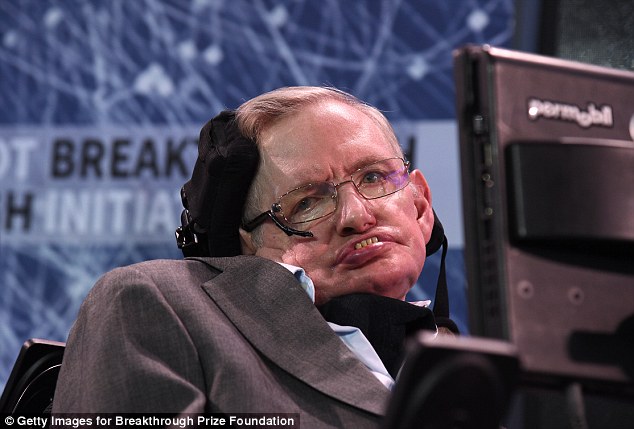


Hawking is shown at a press conference to announce Breakthrough Starshot, a new space exploration initiative, at One World Observatory on April 12, 2016 in New York City
Professor Stephen Hawking has died at the age of 76, a spokesman for his family said.
The famed theoretical physicist died peacefully at his Cambrdige, England home early Wednesday.
In a statement Professor Hawking's children, Lucy, Robert and Tim said: 'We are deeply saddened that our beloved father passed away today.
'He was a great scientist and an extraordinary man whose work and legacy will live on for many years.'
The family went on to boast about Hawking's 'courage and persistence' that inspired people across the world.
'He once said, 'It would not be much of a universe if it wasn't home to the people you love.' We will miss him forever.'
The best-known theoretical physicist of his time, Hawking wrote so lucidly of the mysteries of space, time and black holes that his book, 'A Brief History of Time,' became an international bestseller, making him one of science's biggest celebrities since Albert Einstein.
Even though his body was attacked by motor neurone disease when Hawking was 21, he stunned doctors by living with the normally fatal illness for more than 50 years.
Hawking was born on January 8, 1942 in Oxford, England.
His family had moved to Oxford from north London to escape the threat of World War II rockets.
When he was 8 they moved St. Albans, a town about 20 miles north of the capital, where he would attend St Albans School and later University College, Oxford where his father attended.

Stephen Hawking is pictured with sisters Mary and Phillipa Stephen Hawking
His prodigious talent and unorthodox study methods meant he used few books and made no notes but could still solve problems like no other students.
He wanted to study mathematics but the subject was not available at the college so he chose physics instead.
In 1962 he went to the University of Cambridge’s Department of Applied Mathematics and Theoretical Physics to conduct research in cosmology.
In 1965 he received his PhD with his thesis ‘Properties of Expanding Universes’ and would soon publish his first academic book The Large Scale Structure of Space-Time.
When he was 21 he was diagnosed with amyotrophic lateral sclerosis (ALS), a nerve system disease that weakens muscles and impacts physical function.
 Fire brigade in Shanghai holds group wedding
Fire brigade in Shanghai holds group wedding Tourists enjoy ice sculptures in Datan Town, north China
Tourists enjoy ice sculptures in Datan Town, north China Sunset scenery of Dayan Pagoda in Xi'an
Sunset scenery of Dayan Pagoda in Xi'an Tourists have fun at scenic spot in Nanlong Town, NW China
Tourists have fun at scenic spot in Nanlong Town, NW China Harbin attracts tourists by making best use of ice in winter
Harbin attracts tourists by making best use of ice in winter In pics: FIS Alpine Ski Women's World Cup Slalom
In pics: FIS Alpine Ski Women's World Cup Slalom Black-necked cranes rest at reservoir in Lhunzhub County, Lhasa
Black-necked cranes rest at reservoir in Lhunzhub County, Lhasa China's FAST telescope will be available to foreign scientists in April
China's FAST telescope will be available to foreign scientists in April "She power" plays indispensable role in poverty alleviation
"She power" plays indispensable role in poverty alleviation Top 10 world news events of People's Daily in 2020
Top 10 world news events of People's Daily in 2020 Top 10 China news events of People's Daily in 2020
Top 10 China news events of People's Daily in 2020 Top 10 media buzzwords of 2020
Top 10 media buzzwords of 2020 Year-ender:10 major tourism stories of 2020
Year-ender:10 major tourism stories of 2020 No interference in Venezuelan issues
No interference in Venezuelan issues
 Biz prepares for trade spat
Biz prepares for trade spat
 Broadcasting Continent
Broadcasting Continent Australia wins Chinese CEOs as US loses
Australia wins Chinese CEOs as US loses